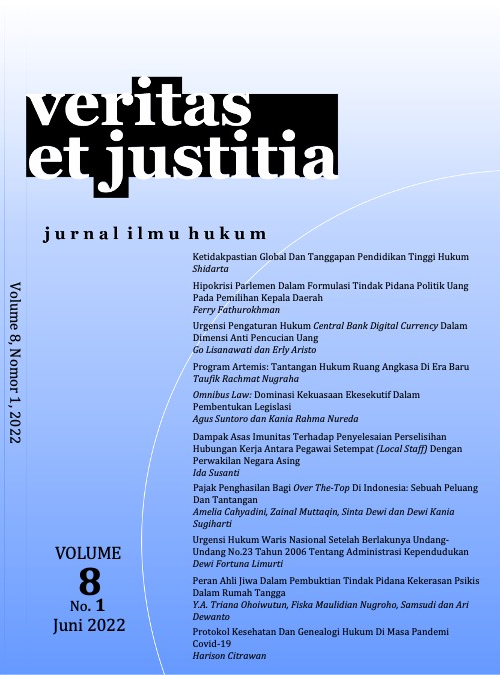URGENSI HUKUM WARIS NASIONAL SETELAH BERLAKUNYA UNDANG-UNDANG NO.23 TAHUN 2006 TENTANG ADMINISTRASI KEPENDUDUKAN
DOI:
https://doi.org/10.25123/vej.v8i1.4644Keywords:
inheritance law; classification of residents; population administrationAbstract
Inheritance Law is the only area of law that still applies different laws for Indonesian citizens with varying groups as regulated in Articles 131 and 163 of the Indische Staats regeling. With the enactment of Law Number 23 Year 2006 concerning Population Administration (UU Adminduk), in Article 106 all Staatsblads regulating the classification of residents in the Birth Certificate are revoked, so that since such Law came into effect, there were no more instructions in the Birth Certificate regarding the classification of an Indonesian citizen. This has had a significant impact on the enforcement of the Inheritance Law, which is still enforce based on the classification of the resident groups. This paper uses a normative juridical approach, so that the urgency of the formation of the National Inheritance Law will be seen from the point of view of legislation, jurisprudence, doctrine and legal literature. Apart from the goal as an independent nation to have a national law, it is also necessary to understand that inheritance law must be formed in accordance with the pluralistic conditions of the Indonesian nation. Raising awareness of the importance of establishing a National Inheritance Law is the aim of this paper, especially as an appreciation of the abolition of population classification by UU Adminduk, and the need for a national law that is in accordance with the spirit of the Indonesian nation, i.e Pancasila.
References
Buku:
Dedi Soemardi, Sumber-sumber Hukum Positip, Alumni, Bandung, 1986
Hulman Panjaitan, Kumpulan Kaidah Hukum Putusan Mahkamah Agung Republik Indonesia Tahun 1953-2008 Berdasarkan Penggolongannya, Prenadamedia Group, Jakarta, 2014
M.T.Felix Sitorus, Hak Waris Janda dan Anak Perempuan Batak Toba Masa Kini, dalam buku Hukum dan Kemajemukan Budaya (sumbangan karangan untuk menyambut hari ulang Tahun ke-70 Prof Dr T.O.Ihromi) ed.E.K.M.Masinambow, Yayasan Obor Indonesia, Jakarta, 2000
Rumonda Nasution, Harta Kekayaan Suami Isteri dan Kewarisannya, BPHN, Jakarta, 1992
Satjipto Rahardjo, Pemanfaatan Ilmu-ilmu Sosial bagi Pengembangan Ilmu Hukum, Alumni, Bandung, 1977
____________________, Hukum dan Perubahan Sosial – Suatu tinjauan teoritis serta pengalaman-pengalaman di Indonesia, Penerbit Alumni, Bandung, 1979
Soediman Kartohadiprodjo, Kumpulan Karangan, PT.Pembangunan, Jakarta, 1965
_______________________________, Pancasila dan Undang-Undang Dasar 1945, Penerbit Binacipta, 1976
_______________________________, Hukum Nasional – beberapa catatan, Penerbit Binacipta, 1978
Soerjono Soekanto dan Mustafa Abdullah, Sosiologi Hukum dalam Masyarakat, Rajawali Pers, Jakarta, 1987
Sudargo Gautama, Aneka Masalah dalam Praktek Pembaharuan Hukum di Indonesia, PT.Citra Aditya Bakti, Bandung, 1990
Sunarjati Hartono, Dari Hukum Antar Golongan ke Hukum Antar Adat, PT.Citra Aditya Bakti, Bandung, 1991
Tjok Isteri Putra Astiti, Hak-Hak Wanita Bali dalam Hukum Adat Waris, dalam buku Hukum dan Kemajemukan Budaya (sumbangan karangan untuk menyambut hari ulang Tahun ke-70 Prof Dr T.O. Ihromi) ed. E.K.M. Masinambow, Yayasan Obor Indonesia, Jakarta, 2000
Wirjono Prodjodikoro, Hukum Antar-Golongan (Intergentiel) di Indonesia, Cetakan kelima, Sumur Bandung, 1976
Jurnal:
Adelina Nasution, Pluralisme Hukum Waris di Indonesia, Jurnal Al-Qadha Volume 5 No.1, Juli 2018
Anajeng Esri Edhi Mahanani, Peranan Politik Hukum dalam Upaya Kodifikasi dan Unifikasi Hukum guna Pembangunan Hukum Nasional yang sesuai dengan Pancasila serta Prinsip Kebhinekaan di Indonesia, Jurnal Hukum Kebijakan Publik Res Publica Volume 1 No.1, 2017
Anak Agung Putu Wiwik Sugiantari, Perkembangan Hukum Indonesia dalam Menciptakan Unifikasi dan Kodifikasi Hukum, Jurnal Advokasi Volume 5 No.2, September 2015
Mohammad Yasir Fauzi, Legislasi Hukum Kewarisan di Indonesia, Jurnal Pengembangan Masyarakat Islam Volume 9 No.2, Agustus 2016
Shintiya Dwi Puspita dan Fabian Fadhly, Legitieme Portie dalam Hukum Waris Islam di Indonesia, Jurnal Ilmu Hukum Veritas et Justitia Volume 1 No.2, 201
Yelia Nathassa Winstar, Pelaksanaan Dua Sistem Kewarisan pada Masyarakat Adat Minangkabau, Jurnal Hukum dan Pembangunan Tahun ke-37 No.2, April-Juni 2007
Majalah:
Andi Nuzul, Upaya Kodifikasi Hukum Kewarisan Secara Bilateral Dengan Pola Diferensiasi Dalam Masyarakat Pluralis, Majalah Mimbar Hukum, Volume 22, Nomor 3, Oktober 2010
Shela Natasha, Penghapusan Pasal Penggolongan Penduduk dan Aturan Hukum dalam Rangka Mewujudkan Unifikasi Hukum (Abolition of Population and Legal Rules Classification Article to Create Unification in Law), Majalah Hukum Nasional Nomor 2 Tahun 2018
Situs Daring:
https://putusan3.mahkamahagung.go.id
http://bphn.go.id/readinfo/main_history, diakses pada tanggal 30 Maret 2018 Jam 22.33 WIB
https://www.hukumonline.com/berita/baca/hol10607/pembaharuan-hukum-catatan-sipil-dan-penghapusan-diskriminasi-di-indonesia?page=1, diakses pada tanggal 19 Juli 2021 pukul 17.50 WIB
Downloads
Published
Issue
Section
License
Copyright (c) 2022 Veritas et Justitia

This work is licensed under a Creative Commons Attribution-NonCommercial 4.0 International License.
Authors who publish with this journal agree to the following terms:
Authors retain copyright and grant the journal right of first publication with the work simultaneously licensed under a Creative Commons Attribution License that allows others to share the work with an acknowledgement of the work's authorship and initial publication in this journal.
Authors are able to enter into separate, additional contractual arrangements for the non-exclusive distribution of the journal's published version of the work (e.g., post it to an institutional repository or publish it in a book), with an acknowledgement of its initial publication in this journal.
Authors are permitted and encouraged to post their work online (e.g., in institutional repositories or on their website) prior to and during the submission process, as it can lead to productive exchanges, as well as earlier and greater citation of published work.
The Journal allow the author(s) to hold the copyright and to retian publishing rights without restrictions.




